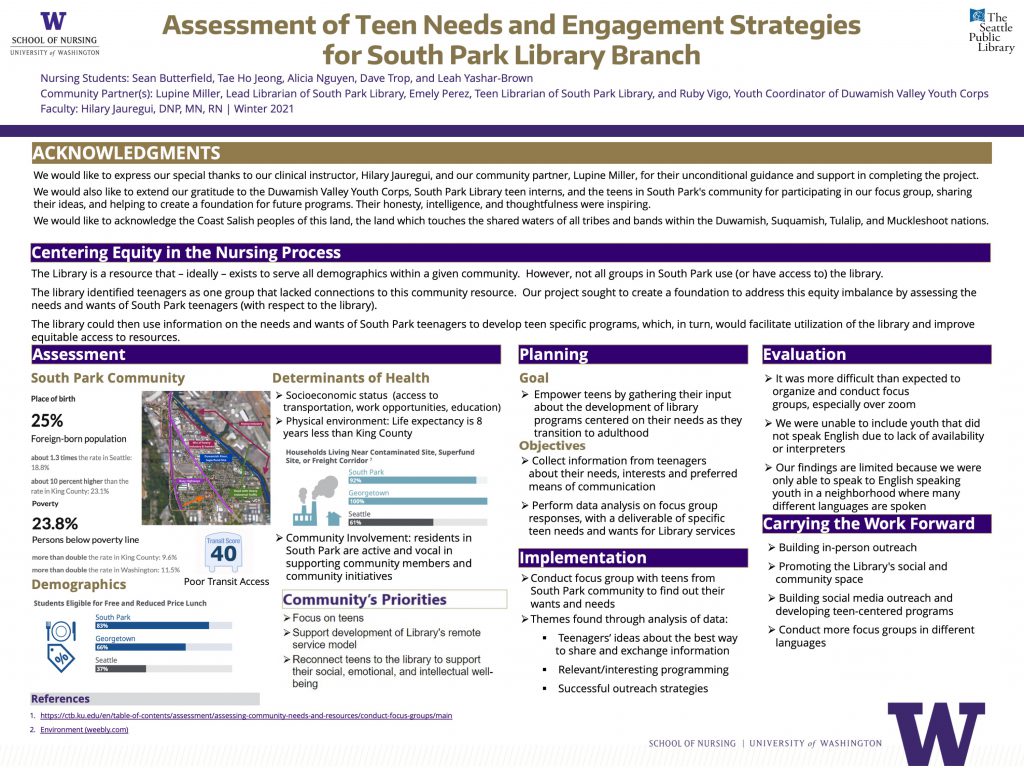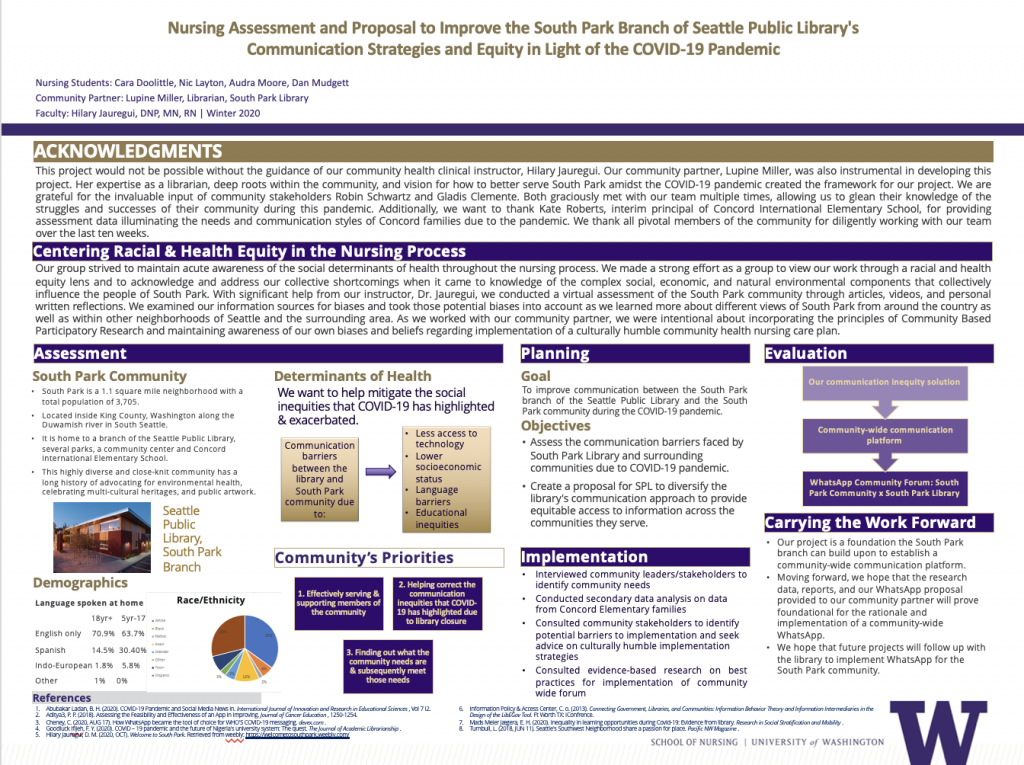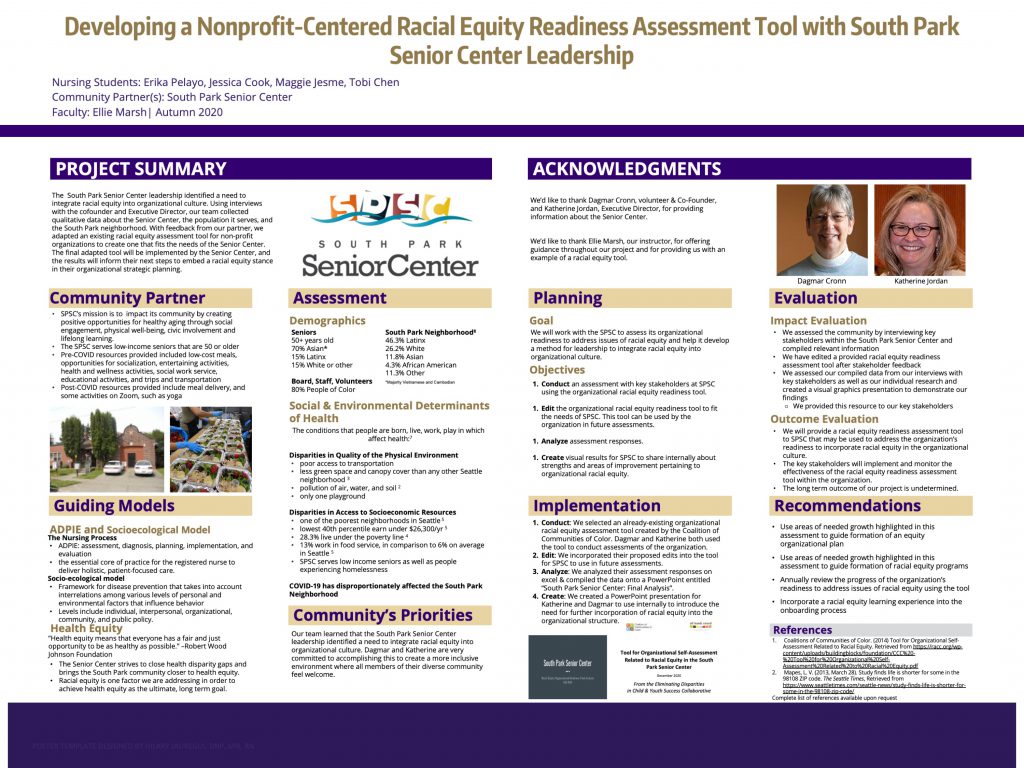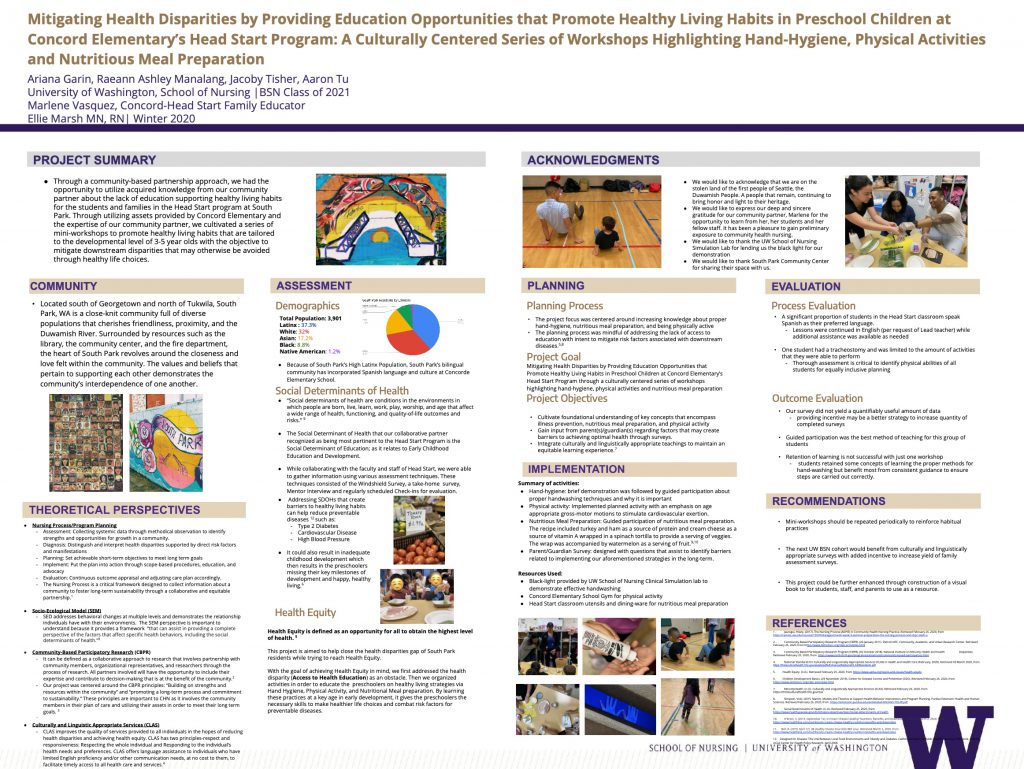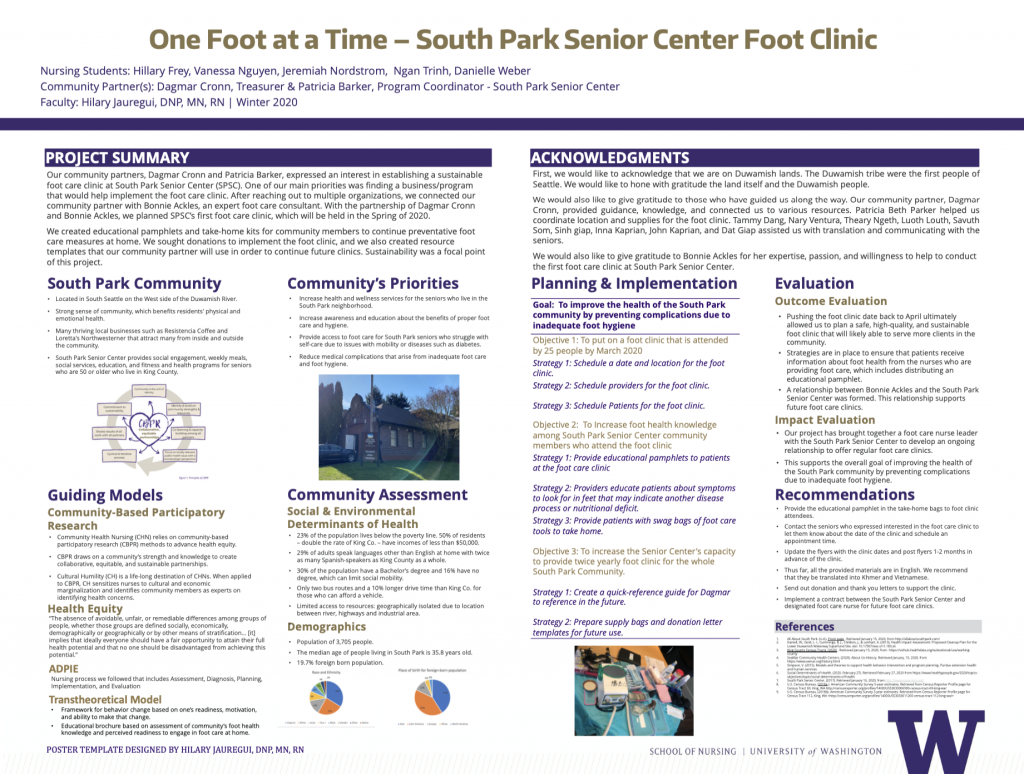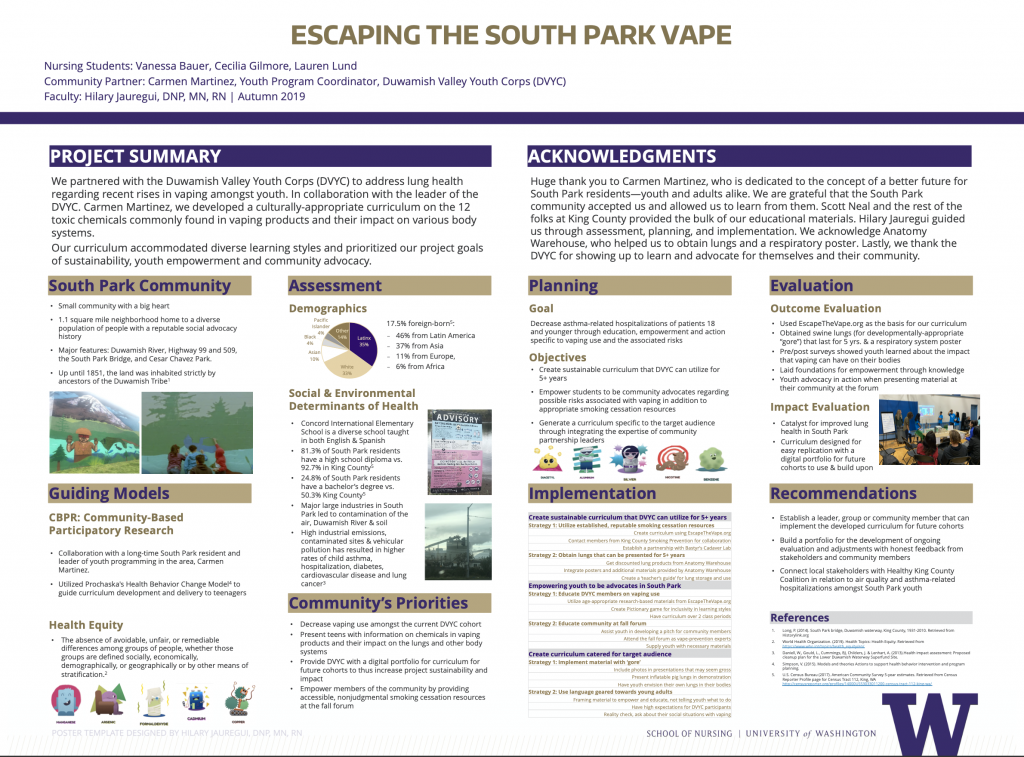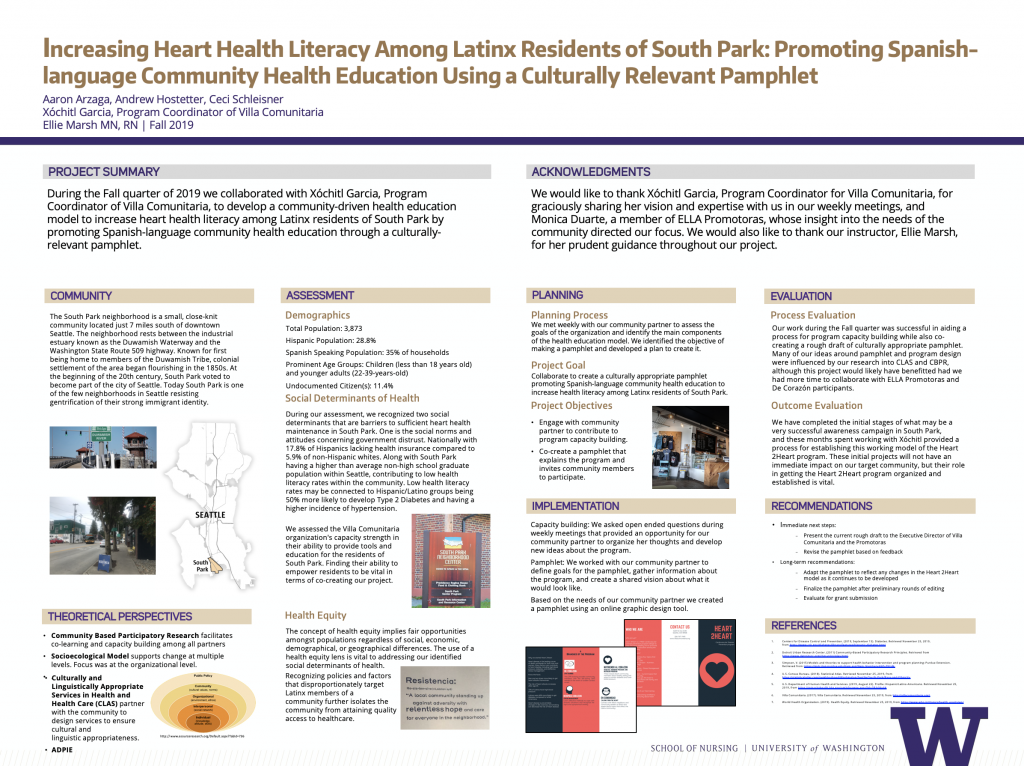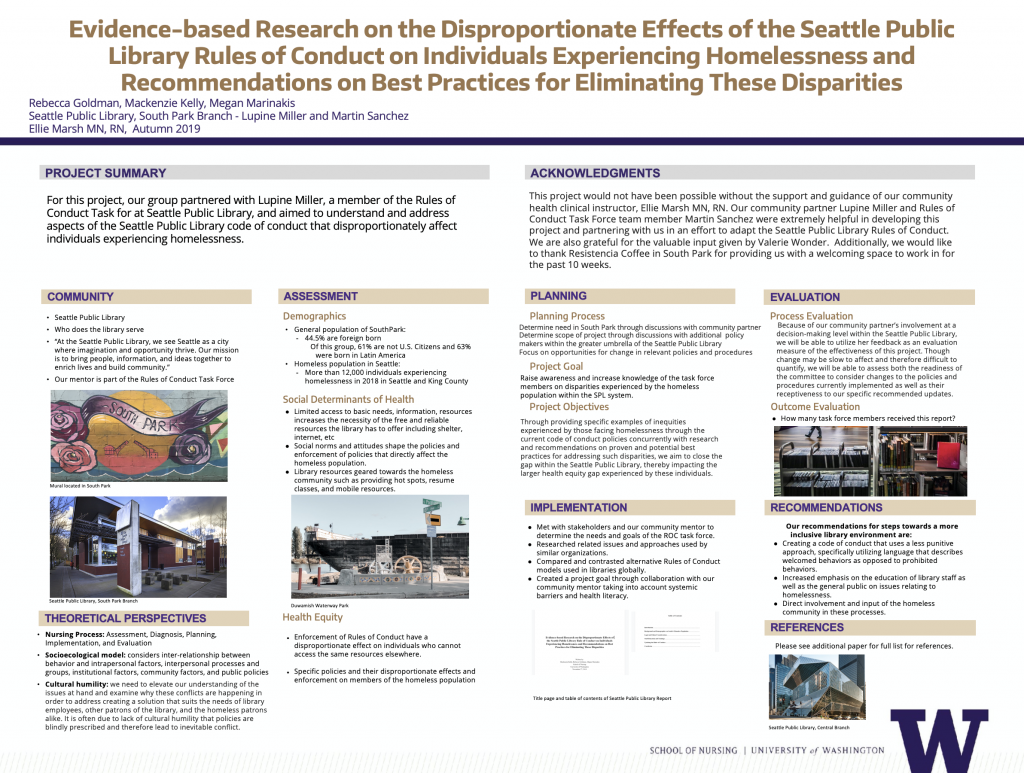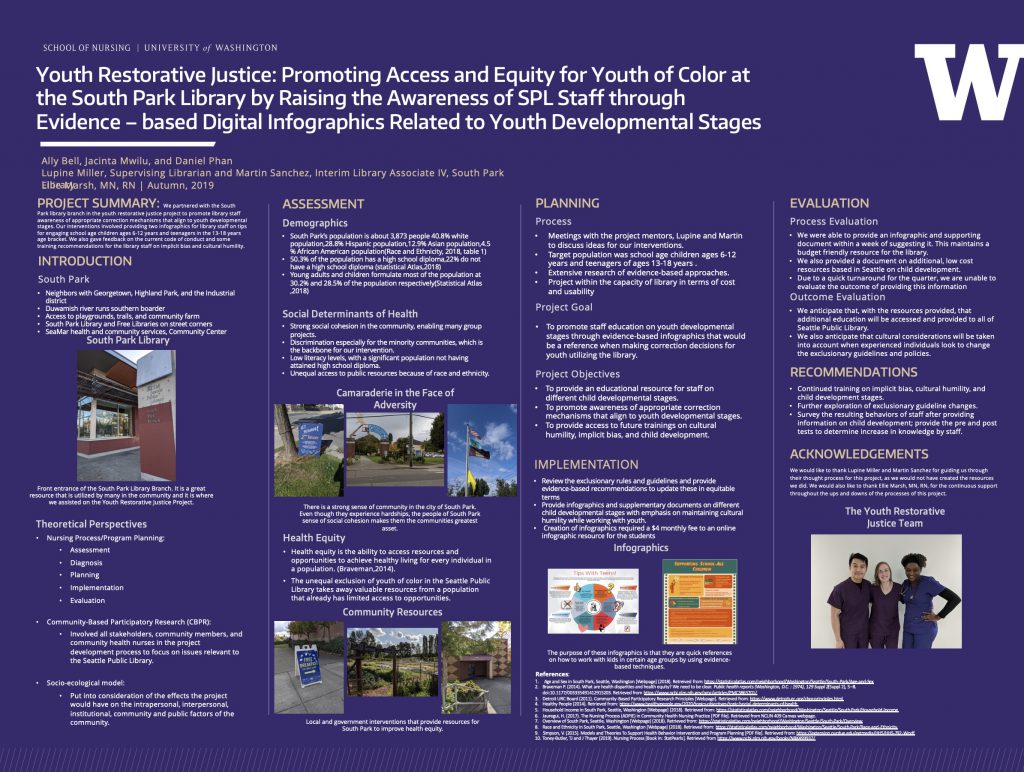Student Projects
Scroll down to read brief descriptions of our student projects over the last 20+ years in South Park, starting with our students’ most recent work. You’ll find their project posters and project reports attached.
You can also use the navigation on the right to search for a specific project, see projects by focus or see all the projects we’ve done with a specific community partner.
Concord PTA: Building Community Beyond Bake Sales
March 10, 2021
Hilary Jauregui
Student Nurses: Nicole Avila, Billy Caracciolo, James Lo, and Cynthia Ortiz Fernandez
Clinical Faculty: Hilary Jauregui, DNP, MN, RN
Concord International Elementary is a diverse school made up of families from many cultures and backgrounds. There are five primary languages spoken: Spanish, English, Vietnamese, Somali, and Khmer. The rich cultures and diversity are what makes Concord such a special place but brings up challenges to creating connections. The PTA received a grant that they used to hire community organizers who spoke each language to help increase language access and build trusting connections among the families of Concord. Our project was to work with the PTA and the hired community organizers to build a platform for the PTA, the families of Concord, and the community organizers collect and share resources. We developed a space for the community organizers to collect and document who the families of Concord are, their language preference, and ways they need support or wish to participate with the school. We created an online “bulletin board’’ website with important resources and announcements available in the main languages spoken by Concord families. We published it online and gave access to the community organizers to edit and update it as needed. We also compiled a document of local resources for the community organizers to be able to look to when connecting with families and their needs. The resources include a list of services, both community-run and discounted services, including access to food, utilities, internet, transportation, and more. We linked where to sign up and receive more information on each service, along with information about who qualifies. We shared these resources with the organizers and PTA and they will be able to update and share them with Concord community and live on after our quarter ends.
Read the full report here!
Assessment of Teen Needs and Engagement Strategies for the South Park Library Branch
March 10, 2021
Hilary Jauregui
Student Nurses: Sean Butterfield, Tae Ho Jeong,
Alicia Nguyen, Dave Trop, and Leah Yashar-BrownClinical Faculty: Hilary Jauregui, DNP, MN, RN
We launched our project based on meetings with our community partners as well as our instructor and our understanding of the community. Based on our assessment data on the community’s needs, we established that our goal with the South Park Library is to empower teens by gathering their input about the development of library programs centered on their needs as they transition from childhood to adulthood. Our job was to find what teens want and need from the community and ultimately, increase the engagement through the library by utilizing the library’s resources and programs. We talked with the Duwamish Valley Youth Corps youth, the library interns, and teens who live in the South Park community and to learn about what they are going through and how the library can provide their needs.
Read the full report here!
Contributing to the South Park Library Goal to Increase Engagement between South Park Teens and Library Resources
December 10, 2020
Hilary Jauregui
Student Nurses: Andi Rasmussen, Emily Galeotti, Lucinda Lu, Teresa Wu, Vivek Naik
Clinical Faculty: Ellie Marsh-Trujillo, MN, RN
Guided by interviews with our community partner, Lead Librarian Lupine Miller, we engaged in several qualitative and quantitative data collection activities to contribute to the Library’s need to strengthen teenage engagement with available South Park Library resources. Utilizing an adapted and remote windshield survey, the development and use of an Interview Tool, and an online literature search on existing methods used to enhance teenage engagement, we developed a guiding tool named “Enhancing Teenage Engagement in Libraries” which offers librarians strategies to pique and maintain teen interest, while accounting for the social determinants of health.
South Park Seniors Community Connection Program with the South Park Senior Center
December 10, 2020
Hilary Jauregui
Student Nurses: Rachel Buchmeier, Sydney Coffey, Zoe Iida, Kristin Swenson & Sarah Tivoli
Nurse Faculty: Hilary Jauregui, DNP, MN, RN
Our team collaborated with the South Park Senior Center to identify ways to connect the community members during these isolating times of the COVID-19 pandemic. Considering the different languages, technology literacy and access, along with other needs of the community, we developed a two-pronged approach for the South Park Community Connection Program: the Pen Pal & Phone-a-Friend programs. In the first round of recruitment, we matched 37 senior citizens. As we know, mental health is vital in overall health, and maintaining that sense of community and connection is very important in these isolating and scary times.
Read more about the project here!
Nursing Assessment and Proposal to Improve the South Park Branch of Seattle Public Library: Communication Strategies and Equity in Light of COVID-19 Pandemic
December 10, 2020
Hilary Jauregui
Student Nurses: Cara Doolittle, Nic Layton, Audra Moore, & Dan Mudgett
Nurse Faculty: Hilary Jauregui, DNP, MN, RN
Our project addresses the communication gap between the South Park community and the South Park Library (SPL). By developing a communication plan to implement WhatsApp, we are addressing the identified communication needs of SPL with the South Park community. A WhatsApp communication platform allows for equitable access to information because it allows for the library to communicate with the community (and vice versa), and for the library to assess the needs and wants of the community when community members cannot access the physical library space. The secondary data analysis we prepared helps to inform our communication plan and to better understand the disparities caused by the COVID-19 pandemic.
Read more about the project here!
Developing a Nonprofit-Centered Racial Equity Readiness Assessment Tool with South Park Senior Center Leadership
December 10, 2020
Hilary Jauregui
Student Nurses: Erika Pelayo, Jessica Cook, Maggie Jesme, Tobi Chen
Nurse Faculty: Ellie Marsh-Trujillo, MN, RN
The South Park Senior Center leadership identified a need to integrate racial equity into organizational culture. Using interviews with the cofounder and Executive Director, our team collected qualitative data about the Senior Center, the population it serves, and the South Park neighborhood. With feedback from our partner, we adapted an existing racial equity assessment tool for non-profit organizations to create one that fits the needs of the Senior Center. The final adapted tool will be implemented by the Senior Center, and the results will inform their next steps to embed a racial equity stance in their organizational strategic planning.
COVID-19 Infection Prevention in Community Service with the South Park Senior Center
April 24, 2020
Hilary Jauregui
Student Nurse: Jeremiah Nordstrom
Nurse Faculty: Hilary Jauregui, DNP, MN, RN
As the Covid-19 pandemic rages on, much of Seattle’s population stays home, but the SPSC continues to operate, as hunger never sleeps and many do not have a home to isolate in. On Mondays, Wednesdays and Fridays, as many as 140 meals are consumed. Tuesday lunch alone services as many as 60 individuals. Within the same community space, many nonprofits share offices and which results in hundreds of client interactions throughout the week.
The homeless population served by SPSC lives at an intersection of immunosuppressive risk factors from weather exposure, mental health disorders, substance abuse, poor education, poverty, poor access to sanitation, close-quarters-habitation, societal neglect, and sometimes, all of the above.
This elevated risk is exacerbated by an inability to, or absent desire to, socially distance from one another in violation of CDC guidelines during our shared crisis. Without intervention, this heightened risk is not only a risk to the homeless population, SPSC staff, and the larger community, but may act as a reservoir from which future outbreaks may spring forth after social isolation precautions have been relaxed.
This same social isolation has collapsed the panhandling economy, restricted outreach efforts, focused emergency services elsewhere, and largely left streets empty. Resultingly, many homeless people are being less cautious about their drug and alcohol abuse. Attempts to get them to observe social distancing has been described as “a never-ending battle” by staff serving this community. Individuals share cigarettes, needles, coffee and stand close to each other. We know many of them have underlying health issues that put them at higher risk, not to mention there are no hygiene facilities nearby. Most resources they used are closed, which leaves SPSC as the only bathrooms they have available, yet these same bathrooms are shared by all staff at the neighborhood center, so their use exposes all staff to infection.
The effort to mitigate these issues is threefold:
- Provide alternate location for urination/defecation/sanitation.
- Create transmission barriers to protect staff and clients during otherwise routine distribution of resources.
- Promote the acquisition of Census data for clientele so that future federal/state budgets may more accurately reflect community needs.
Read the full report here!
Contribution of New Data toward Increasing Resources for Post High School Opportunities through the Seattle Public Library – South Park
March 12, 2020
Hilary Jauregui
Student Nurses: Mariyam Arifova, Ian Clouthier, Nancy Huynh, Hannah Nguyen & Krystal Sheedy
Nurse Faculty: Ellie Marsh, MN, RN

Our Community Health Nursing Clinical project group consisted of five students from the University of Washington BSN program in collaboration with the Seattle Public Library - South Park branch and their lead librarian Lupine Miller. Several theoretical models were used to develop this project including the nursing process known as ADPIE, CBPR, and the Socio-ecological perspective. Through the use of the ADPIE and Cultural Humility frameworks, our group assessed the community and planned our project to address the needs and disparities found in South Park related to reduced levels of employment and post high school education among teens and young adults. Our project aimed to gather data to understand the perceptions, assets, and barriers among the teen population in South Park through the implementation of a survey given to the Duwamish Valley Youth Corps, as a representative group of the teen population in the community. We then evaluated the collected data, shared it with our community partner and collaborated to form a list of ideas and strategies for increasing resources related to post high school opportunities at the South Park library.
See the poster presentation here and read the full report here!
Escape the South Park Vape 2 with the Duwamish Valley Youth Corps
March 12, 2020
Hilary Jauregui
Student nurses: Kendra Creech, Madeline Dautel, Elizabeth Emig & Yohannah Malabad
Nurse Faculty: Hilary Jauregui, DNP, MN, RN
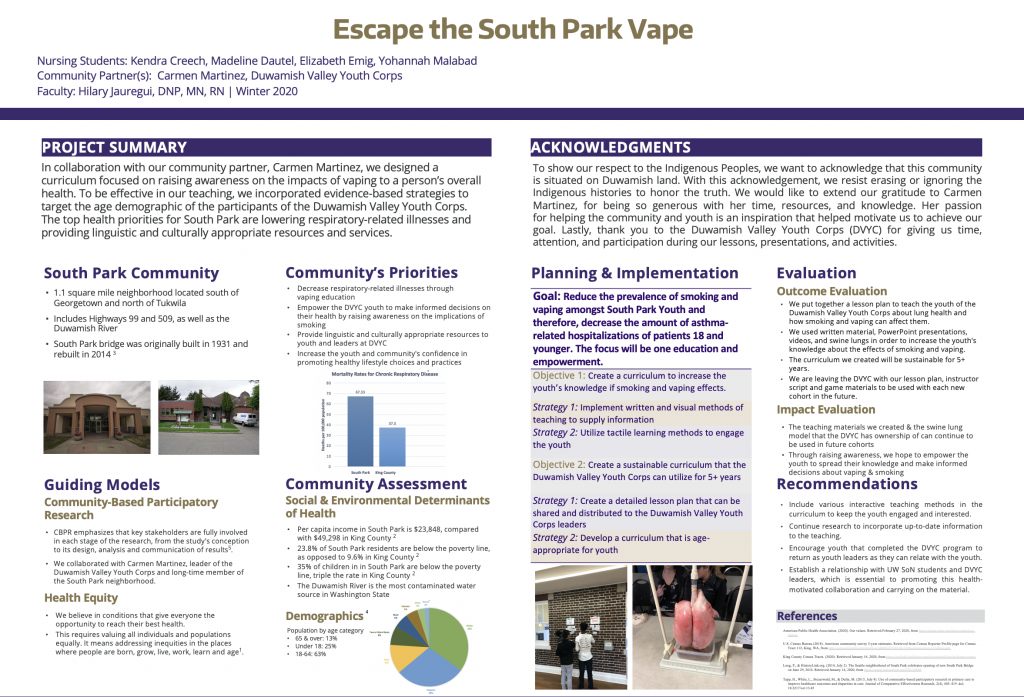
Executive Summary
Introduction
South Park is a small neighborhood of 3,705 people in Seattle, WA. It is a close-knit community full of culturally diverse individuals. South Park is home to the Duwamish Valley Youth Corps (DVYC), a group of youth ages 13-18, who partake in community work and learning.
Community Health Issue
South Park has a disproportionally higher rate of respiratory-related illnesses than other neighborhoods in King County. This quarter, our project focused on educating the youth of the DVYC about the negative effects of smoking and vaping. Through developing an interactive and age-appropriate curriculum, we were able to educate the DVYC youth and empower them to make healthy choices regarding lung health.
Community Health Assessment
There are many inequities in South Park, many resulting from the negative impact of the social determinants of health. Per capita income, life expectancy, and education attainment rates are all lower in South Park than those of other Seattle neighborhoods. Air pollution and a contaminated Duwamish River also contribute to poor health outcomes. Despite these challenges, South Park has many strengths – a community center, food bank, and library are wonderful assets to the neighborhood.
Community Health Improvement Plan
We worked with Carmen Martinez, leader of the DVYC, to develop our health improvement plan. Through listening to Carmen and engaging in a Community Based Participatory Research approach, we learned about the air pollution and high asthma rates in South Park, and why lung health is a priority for youth in this community. In addition to partnering with Carmen, we used the evidence-based “Escape the Vape” curriculum to develop engaging lesson plans and methods of teaching.
Project Evaluation
Through our research and partnership with Carmen, we met our objectives and strategies. We created a curriculum that increased the youth’s knowledge of smoking and vaping effects and evaluated this through a pre- and post-test comparison of the youth’s knowledge about the information we taught. We also ensured our curriculum was sustainable and could be used for 5+ years.
Recommendations & Next Steps
It is our recommendation that the partnership between the University of Washington School of Nursing (SoN) and the DVYC be maintained. Through teaching up-to-date research about smoking and vaping effects in a fun and interactive manner, it is our hope that the youth will retain this important information for years to come. It is our hope that this curriculum will continue to be taught.
Conclusion
Community based participatory research is essential in community health nursing. Collaboration between nurses and community leaders provides an effective partnership, in which the community’s needs can be met. Our partnership with Carmen and the DVYC has allowed us to educate the youth about smoking and vaping in an appropriate and engaging way.
See the poster presentation here and read the full report here!
Mitigating Health Disparities by Providing Education Opportunities that Promote Healthy Living Habits in Preschool Children at Concord Elementary’s Head Start Program
March 12, 2020
Hilary Jauregui
Student Nurses: Ariana Garin, Raeann Ashley Manalang, Jacoby Tisher & Aaron Tu
Nurse Faculty: Ellie Marsh MN, RN
Our team utilized The Nursing Process as the planning framework to learn what health disparities preschoolers were facing at Concord Elementary school. We learned this from our walking/windshield survey, our survey we sent home for families to fill out, but, the most important information we gathered was from our community site mentor. We determined that Education was the Social Determinant of Health we wanted to focus on during our project. With our mentor’s priorities in mind, we created a survey in order to gain vital information for our planning process. We implemented our plan by guiding preschoolers throughout workshops focused on proper hand-hygiene, physical activity and nutritious meal planning. There was a fair amount of preschoolers who preferred to be spoken to in Spanish, knowing this we made accommodations for these students through non-verbal communication, pictures, and help from our site mentor as she also spoke Spanish. The outcome evaluation taught us that it’s important that the healthy living habits we focused on be repeated throughout the year as repetition is important for growth and to form long-term habits. We have made the recommendation to our community site mentor to continue doing our workshops through the year and for the next cohort of nursing students to continue this project. They can continue this project by providing incentive to family members in order to increase the yield of surveys. Per our site mentor’s request, the families and additional staff can benefit from a visual book as a resource to utilize information that was presented during our workshops.
One Foot at a Time - South Park Senior Center Foot Clinic
March 12, 2020
Hilary Jauregui
Nursing Students: Hillary Frey, Vanessa Nguyen, Jeremiah Nordstrom, Ngan Trinh & Danielle Weber
Nurse Faculty: Hilary Jauregui, DNP, MN, RN
Executive Summary
Introduction
South Park is a small neighborhood located between the Duwamish River and Highway 509. We spent our community health clinical this quarter in South Park, working with the South Park Senior Center to plan and implement a foot care clinic.
Community Health Issue
Our community partner, Dagmar Cronn, shared her concerns about the health complications due to inadequate foot hygiene among seniors. We worked on establishing a sustainable foot care clinic at the Senior Center in order to mitigate the health issue.
Community Health Assessment
After completing a windshield survey and holding discussions with community leaders, we found that South Park is a diverse community where a significant percentage of the population is foreign-born. One major challenge the community faces is that they are physically cut off from other neighborhoods due to geographic location and industrialization. This cuts off the community’s access to resources that could potentially benefit their health. Although they are more isolated from the greater Seattle area, their sense of community and support for each other surpasses the challenges they face.
Community Health Improvement Plan
Our plan was to organize and implement the first foot clinic at South Park. We collaborated with our community partner and an expert foot care consultant to set up a foot clinic that will be held in Spring of 2020. We worked towards the goal of improving foot care hygiene within the South Park community by creating educational pamphlets and arranging for expert foot care nurses to provide care and education to the seniors.
Project Evaluation
Although the foot clinic did not occur within the original timeframe, we anticipate that the foot clinic will have long term benefits in the community. The sustainability of the foot clinic is dependent on the ongoing relationship built between South Park Senior Center (SPSC) staff and local foot care nurses.
Recommendations & Next Steps
In the future, we recommend that the South Park Senior Center staff reach out to Bonnie Ackles at least three months in advance when planning for another foot clinic. We also recommend collecting ongoing donations to support the foot clinic, and assembling and districting the foot care supply bags and educational pamphlets to attendees.
Conclusion
We would like to thank our community partners, Bonnie Ackles, and the South Park seniors for allowing us to be a part of their community. We look forward to seeing what the future holds for the South Park Foot Clinic.
See the poster presentation here and read the full report here!
Escaping the South Park Vape with Duwamish Valley Youth Corps
December 6, 2019
Hilary Jauregui
Student Nurses: Vanessa Bauer, Cecilia Gilmore & Lauren Lund
Nurse Faculty: Hilary Jauregui, DNP, MN, RN
As nursing students at the University of Washington, we spent this Autumn quarter working in South Park with the Duwamish Valley Youth Corps (DVYC). The DVYC is an organization that engages youth—typically between the ages of 12 and 15—in a variety of environmental justice and public health issues. For each topic, DVYC brings in a community specialist to talk with the youth. We were brought in to teach them about preventable lung illness, specifically as it relates to vaping.
In partnership with Carmen Martinez, we chose to focus on how various chemicals found in vape products impact the human body. We planned our approach based on social determinants of health and developed our curriculum to be culturally relevant and age appropriate. Collaboration with local resources was key. We incorporated different theories of healthcare and various methods of learning in an effort to get through to all students. We bought swine lungs, delivered presentations, provided worksheets, and empowered the youth to advocate for themselves.
At the end of the quarter, the youth in the DVYC are given an opportunity to take what they learned and teach it to their peers at the fall forum. Four students tweaked our curriculum and taught community members about the dangers associated with vaping.
Sustainability was really important to us in developing this project, so the last several weeks of the quarter have been spent creating an accessible portfolio of learning materials that future cohorts can utilize and build upon.
Read the full report here!
Improving Sexually Transmitted Infection Knowledge in South Park with Sea Mar
December 6, 2019
Hilary Jauregui
Student Nurses: Olivia Brown, Sheila Karuri, & Biftu Mohamed
Nurse Faculty: Hilary Jauregui, DNP, MN, RN
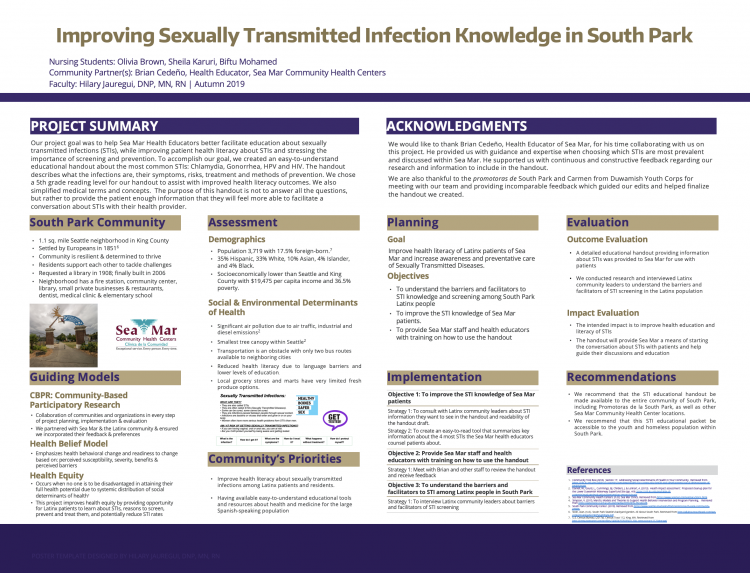 Our project goal was to help Sea Mar Health Educators better facilitate education about sexually transmitted infections (STIs), while improving patient health literacy about STIs and stressing the importance of screening and prevention. To accomplish our goal, we created an easy-to-understand educational handout about the most common STIs: Chlamydia, Gonorrhea, HPV and HIV. The handout describes what the infections are, their symptoms, risks, treatment and methods of prevention. We chose a 5th grade reading level for our handout to assist with improved health literacy outcomes. We also simplified medical terms and concepts. The purpose of this handout is not to answer all the questions, but rather to provide the patient enough information that they will feel more able to facilitate a conversation about STIs with their health provider.
Our project goal was to help Sea Mar Health Educators better facilitate education about sexually transmitted infections (STIs), while improving patient health literacy about STIs and stressing the importance of screening and prevention. To accomplish our goal, we created an easy-to-understand educational handout about the most common STIs: Chlamydia, Gonorrhea, HPV and HIV. The handout describes what the infections are, their symptoms, risks, treatment and methods of prevention. We chose a 5th grade reading level for our handout to assist with improved health literacy outcomes. We also simplified medical terms and concepts. The purpose of this handout is not to answer all the questions, but rather to provide the patient enough information that they will feel more able to facilitate a conversation about STIs with their health provider.Read the full report here!
Reducing Oral Health Inequities Through A Free Mobile Dental Clinic with the South Park Senior Center
December 6, 2019
Hilary Jauregui
Student Nurses: Kimberly Alarcon-Sanchez, Kanitha Khiev, & Kalila Zunes-Wolfe
Nurse Faculty: Hilary Jauregui, DNP, MN, RN
We collaborated with the South Park Senior Center to establish a partnership with Medical Teams International NW (MTI) to provide a free mobile dental clinic to South Park’s seniors. We reached out to community dentist Dr. Giap, who provided pro bono dental care to seven seniors out of a dental van parked outside the Se nior Center on November 26, 2019. This mobile dental clinic, specifically offered to clients facing financial and transportation barriers to dental care, is expected to take place on an annual basis.
Read the full report here!
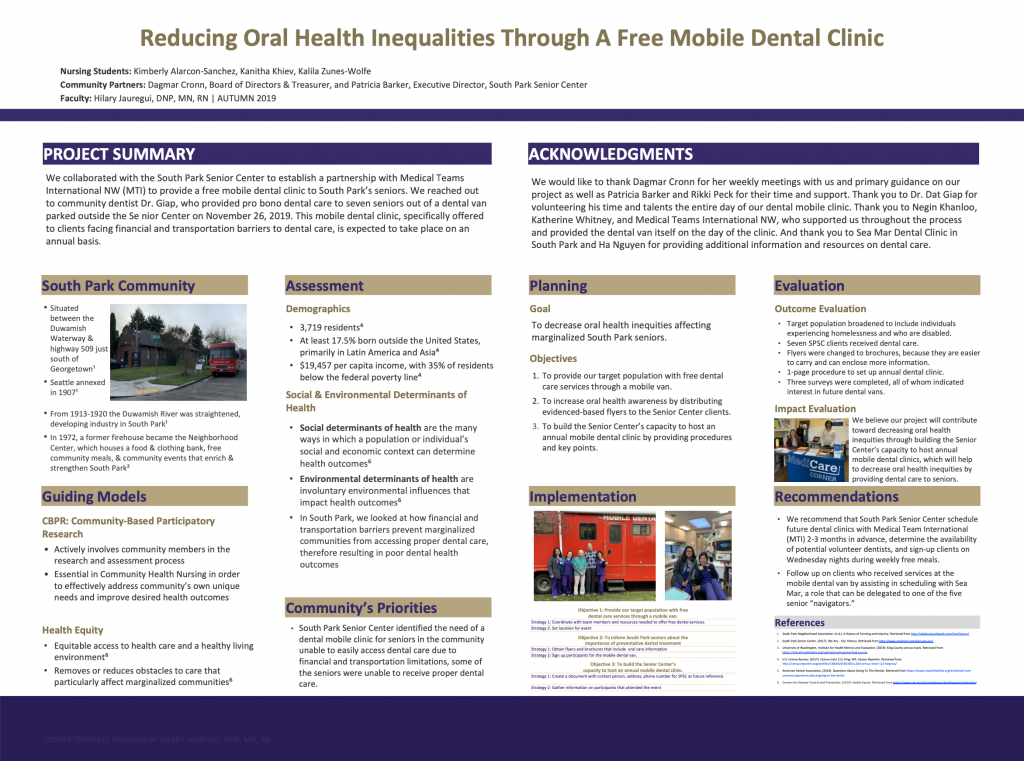
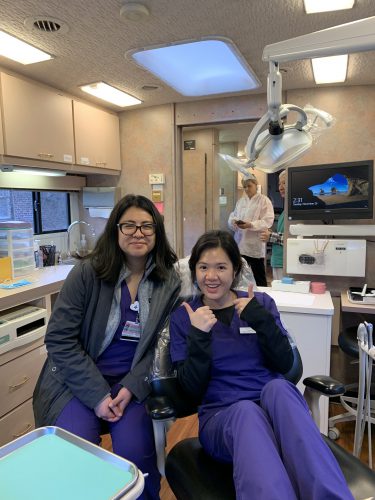

Increasing Heart Health Literacy with Villa Comunitaria
December 6, 2019
Hilary Jauregui
Nursing Students: Aaron Arzaga, Andrew Hostetter & Ceci Schleisner
Nurse Faculty: Ellie Marsh, MN, RN
Our project was titled: "Increasing Heart Health Literacy Among Latinx Residents of South Park: Promoting Spanish-language Community Health Education Using a Culturally Relevant Pamphlet." During the Fall quarter of 2019 we collaborated with Xóchitl Garcia, Program Coordinator of Villa Comunitaria, to develop a community-driven health education model to increase heart health literacy among Latinx residents of South Park by promoting Spanish-language community health education through a culturally-relevant pamphlet.
See the full report here!
Impact of Code of Conduct on Those Experiencing Homelessness with Seattle Public Library
December 6, 2019
Hilary Jauregui
Nursing Students: Rebecca Goldman, Mackenzie Kelly & Megan Marinakis
Nurse Faculty: Ellie Marsh, MN, RN
Our project was titled: "Evidence-Based Research on the Disproportionate Effects of the Seattle Public Library Code of Conduct on Individuals Experiencing Homelessness and Recommendations on Best Practices For Eliminating These Disparities." For this project, our group partnered with Lupine Miller, a member of the Rules of Conduct Task for at Seattle Public Library, and aimed to understand and address aspects of the Seattle Public Library code of conduct that disproportionately affect individuals experiencing homelessness.
Read the full report here!
Youth Restorative Justice with the Seattle Public Library
December 6, 2019
Hilary Jauregui
Nursing Students: Ally Bell, Jacinta Mwilu & Daniel Phan
Nurse Faculty: Ellie Marsh, MN, RN
Our project is titled: "Youth Restorative Justice: Promoting Access and Equity for Youth of Color at the South Park Library by Raising the Awareness of SPL Staff through Evidence – based Digital Infographics Related to Youth Developmental Stages." We partnered with the South Park library branch in the youth restorative justice project to promote library staff awareness of appropriate correction mechanisms that align to youth developmental stages. Our interventions involved providing two infographics for library staff on tips for engaging school age children ages 6-12 years and teenagers in the 13-18 years age bracket. We also gave feedback on the current code of conduct and some training recommendations for the library staff on implicit bias and cultural humility.
Read the full report here!
Promoting Equitable Transportation Access Among Vietnamese Seniors in South Park
March 15, 2019
Hilary Jauregui
Nurse Faculty: Ellie Marsh, MN, RN
In partnership with South Park Senior Center, Seattle Neighborhoods, and Seattle Department of Transportation, we hosted a Community Conversation (CC) for the Vietnamese senior cohort of South Park. The goal of the Community Conversation was to inform the Vietnamese seniors of various transportation options and renting assistance to improve their accessibility and utilization.
Read the full report here!
Fresh Bucks Voucher Program with the South Park Senior Center
March 15, 2019
Hilary Jauregui
Student Nurses: Tanvi Aggarwal, Kayla McCarthy & Jason Sharp
Nurse Faculty: Hilary Jauregui, DNP, MN, RN
Project Description:
The City of Seattle is rolling out a new Fresh Bucks program to serve low income families with funding from Seattle’s Sweetened Beverage Tax. Participants that enroll in the program will receive $40 in Fresh Bucks vouchers each month. For our project, we set up outreach efforts in partnership with the South Park Senior Center (SPSC), to increase Fresh Bucks awareness among South Park community members and stakeholders impacted by food insecurity. SPSC was given approximately 650 Fresh Bucks coupons, valued at $10 each to use during the month of February. We distributed these coupons and conducted surveys as part of our outreach efforts.
Goal: Reduce food insecurity in South Park by increasing access to fresh fruits and vegetables for community members with low or very limited income levels.
Objectives:
- Provide a clear outline of how the Fresh Bucks voucher program is to be implemented.
- Raise awareness about the $40/month Fresh Bucks voucher program that will be available for enrollment at South Park Resource and Information Center (SPIARC) from March to May 2019.
- Compile a database of eligible potential applicants for the $40/month Fresh Bucks voucher program that will be available for enrollment at SPIARC from March to May 2019.
Read the full report here!
South Park Community Garden with Duwamish Valley Youth Corps
December 15, 2018
Hilary Jauregui
Student nurses: Pheroney Chea, Karina Valtierra, Lauren Kelly
Nurse Faculty: Hilary Jauregui, DNP, MN, RN
South Park is a neighborhood of south Seattle that is a mix of industrial, residential homes, and small businesses. As community health nursing students during our ten weeks in South Park, we used the Nursing Process, Social Ecological model and Community Based Participatory Research (CBPR) principles to address a need in the community. We collaborated with our community partner, Carmen Martinez, and the Duwamish Valley Youth Corps to mitigate food injustice and promote nutrition in South Park. The idea of building a community garden and utilizing a greenhouse located at the Neighborhood Center was identified to address these issues. We also wanted to build on the community’s strengths by educating the youth on nutrition with educational lessons about a healthy diet. We planned the knowledge and experience that the Duwamish Valley Youth could develop into skills for not only health promotion, but would also strengthen the community from within.
Read the full report here!
Free Flu Shot Clinics with the South Park Senior Center
December 15, 2018
Hilary Jauregui
Student Nurses: Eva Paquette, Kristin Jones, & Michele Akrim
Nurse Faculty: Hilary Jauregui, DNP, MN, RN
The goal of this community health nursing project was to reduce annual influenza rates in the adult and senior populations in the South Park community. This goal was accomplished through 3 primary objectives. First, education was provided to adults and seniors about the benefits of influenza vaccination. Next, two free flu vaccine clinics were offered on November 3, and November 16, 2018 by partnering with Bartell Drugs and Sea Mar Community Health Centers, respectively. Finally, the students provided a sustainable solution to SPSC for providing free annual flu vaccine clinics.
Read the full report here!
Traffic Light Food Guide for South Park Healthy Families Program with Sea Mar
December 15, 2018
Hilary Jauregui
Student nurses: Aurora Peterson, Avery O’Hara, and Carla Cobb
Nurse Faculty: Hilary Jauregui, DNP, MN, RN
As part of the UW School of Nursing, our team formed a collaborative partnership with Sea Mar Community Health Center of the South Park neighborhood in Seattle for our Community Health Nursing clinical rotation. We combined our expertise as nursing students with Sea Mar’s knowledge and experience of the South Park community to direct our attention toward Sea Mar’s Healthy Families obesity treatment program. Sea Mar’s Health Educator, Mr. Brian Cedeño, presented our team with a project intended to target the high rates of pediatric obesity in South Park. The goal of our project is to reduce childhood obesity in South Park. To contribute to this goal, we set two objectives, to: (1) modify and adapt the Seattle Children’s Research Institute SHIFT food guide to be culturally and linguistically appropriate for the South Park Community, and (2) understand the food environment within the community of South Park. By adapting this guide, we aimed to build the capacity of Sea Mar to implement in the Healthy Families obesity treatment program. Our team named the project Traffic Light Food Guide and presented a finished product to Mr. Cedeño and key South Park community leaders for review and feedback at the end of the quarter. With a more culturally appropriate nutrition resource on hand, Sea Mar will be able to begin implementation of their new Healthy Families program and strengthen their ability to help community members implement healthy lifestyle changes that fits within the culture of the South Park community.
Read the full report here!
Supporting Sustainability for the Backpack Program at Concord International Elementary
December 15, 2018
Hilary Jauregui
Student nurses: Andrea O’Neil, Holli Machmer, and Kathleen Norman
Nurse Faculty: Hilary Jauregui, DNP, MN, RN
The neighborhood of South Park was once a farmland that supplied Seattle’s markets. Today, it is a community of approximately 4,000 residents that is surrounded by encroaching industry. Due to environmental and social determinants of health, South Park has one of the lowest life expectancy rates in King County. Despite the challenges they face, community members are a tight knit, strong force of advocacy. A team of three nursing students from University of Washington chose to work with Concord International Elementary School, a sub-community within South Park. The school participates in the Backpack Program, which mitigates food insecurity by providing Concord students with food for the weekend. The nursing students’ overarching goal of bringing sustainability and efficiency to the program was achieved through four objectives. By focusing on reduction of time spent getting the food to the school, improvement of community outreach, aggregation of outside resources related to food security, and simplification of the program outline, the nursing students hope to bring sustainability to the Backpack Program for years to come. Although the team will not be able to evaluate the long-term impact, the strategies they implemented were well received by the community.
Read the full report here!
Determining Barriers to Attendance At Concord International Elementary
March 15, 2018
Hilary Jauregui
Student nurses: Olivia Counihan, Shelby MacKenzie & Julia Troy
Nurse Faculty: Hilary Jauregui, DNP, MN, RN
South Park is a very tight knit community that lacks access to many outside resources. One of the areas that south Park is lacking is in its social services. We created a survey to bring to light the barriers that limit or prevent children from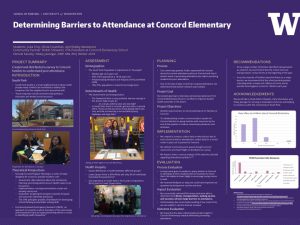 getting to school on time or cause them to be absent. Our project goal is to decrease unnecessary absences from Concord Elementary. We provided surveys in three different languages (English, Spanish, Vietnamese) in order to best reach the community at South Park. We received back a total of 84 surveys from all grade levels. Our data highlighted that illness, vacation, transportation, and waking up late are major barriers for children at Concord. We hope that our survey data will be useful in the future in both changing the current attendance policy and eliminating barriers that arise for kids to attend school.Read the full report here!
getting to school on time or cause them to be absent. Our project goal is to decrease unnecessary absences from Concord Elementary. We provided surveys in three different languages (English, Spanish, Vietnamese) in order to best reach the community at South Park. We received back a total of 84 surveys from all grade levels. Our data highlighted that illness, vacation, transportation, and waking up late are major barriers for children at Concord. We hope that our survey data will be useful in the future in both changing the current attendance policy and eliminating barriers that arise for kids to attend school.Read the full report here!
Dream to Degree with Seattle Public Library, South Park Branch
March 15, 2018
Hilary Jauregui
Student Nurses: Cynthia Lau and Haile Martin
Nurse Faculty: Ellie Marsh, MN, RN
In partnership with our mentor, we analyzed career interests of South Park middle school and high school students and families. With the data gathered, we produced various resources for attaining higher education and career advancement.
Read the full report here!
Secondary Data Analysis & Capacity Building for Exploration of on-site Narcan Administration with Seattle Public Library - South Park Branch
December 15, 2017
Hilary Jauregui
Student Nurses: Matt O'Hare, Rachelle Eckert, Ramona Emerson
Nurse Faculty: Hilary Jauregui, DNP, MN, RN & Ellie Marsh, MN, RN
Project Aim: Synthesize relevant research, policy, legal and physiological information related to opioid reversal medication administration and develop a community education pamphlet on narcan administration.Quarter Project Summary: Recent major news outlet attention has been drawn toward an important prevailing public health epidemic: opioid addiction. Over the course of 10 weeks, our project team partnered with the community of South Park, in Seattle, Washington. During this time-frame, implementation of the nursing process was combined with community and public health principles. Through capacity building, our group assisted our community partner in learning the about opioid reversal administration programs and the development an informational pamphlet was created specifically for community member education about opioid overdose identification and prevention promotion.Next Steps: We identified interest in other community members (e.g. business owners) who are interested in exploring a community narcan administration training. We recommend a community organization take the lead on offering this training to community members.Read the full report here!
Encouraging Healthy Habits at Head Start: Nutrition & Hand Hygiene
December 6, 2017
Hilary Jauregui
Student Nurses: Bob Howell, Natalie Parker, Irina Melinchuk
Nurse Faculty: Hilary Jauregui, DNP, MN, RN

Head Start Project Poster Bob Howell, Natalie Parker, Irina Melinchuk
Project Aim: To increase the healthy habits among the Head Start students through education on nutrition and hand hygiene.For our rotation in Community Health we chose to work at the Head Start Program at Concord International Elementary. We continued last year’s project of facilitating healthy eating habits. We added a portion of health living as it seemed proper with cold season coming up to teach the kids the importance of washing their hands. We wanted to continue last year’s project due to one of the teachers mentioning the increase in childhood obesity in South Park and the lack of easy access to fresh produce. We planned three main projects with the kids from demonstrating the importance of proper handwashing, to showing the kids how an apple grows from a seed to a tree that produces fruit and building an in class garden for them to possibly start growing their own fruits and vegetables in the spring. Overall, the year had some challenges with completing certain projects, but ended up being a success. We got instant feedback from the kids through their facial expressions and feedback when a few of the students were able to repeat what we taught them a couple weeks earlier.
Next Steps: Our recommendation for future student teams is that they pick projects that can build sustainability for future students to build off of. For next year to continue doing this project, but incorporate a class field trip to Marra Farms so the kids can really understand the ability to grow your own fruits and vegetables. For the head start program we want to build consistency. In order for this to happen at Concord we recommend that at the end of each quarter the students build the teachers a template of projects and information about health care that they can easily teach the kids after we’re gone. This way when UW students are not present the kids are still being taught the importance of eating healthy and healthy living. With this template it can also be passed on to future students of what the kids have been taught and they can build off previous projects and add their own recommendations to the template to continue consistent teaching. Having this consistent practice of being taught healthy choices and nutrition will help to ingrain the knowledge better.
Read the full report here!
Encouraging Healthy Habits at Head Start: Nutrition, Hand Hygiene & Physical Activity
December 6, 2017
Hilary Jauregui
Student Nurses: Terry Bui, Johnny Nguyen, Samantha Lee
Nurse Faculty: Ellie Marsh, MN, RN
Project Aim: To increase the healthy habits among the Head Start students through education on nutrition, hand hygiene and physical activity.
Based on our assessment and interviews with the teachers, we created three lesson plans for hand hygiene, healthy vs. unhealthy foods, and physical activity (dance). Our lessons incorporated various modes of communication, and the teachers interpreted into Spanish for us.
Wellness Fair at the South Park Senior Center
June 15, 2017
Hilary Jauregui
Faculty: Noel Chrisman, PhD, MPH and Hilary Jauregui, DNP, MN, RN
We worked with the South Park Senior Center to organize a wellness fair for area seniors. This event, which was put on in partnership with the Seattle Visiting Nurse Association, provided attendees with a free health screening and consultation by a registered nurse, as well as educational materials regarding local services.
Read the full report here!
Sister Circle Health Education with the South Park Community Center
March 15, 2017
Hilary Jauregui
Faculty: Noel Chrisman, PhD, MPH
Sister Circle is a group based out of the South Park Community Center that fosters open discussion in a safe space for teenage girls. This program was initially conceived by Carmen Martinez and a UW SoN student in fall of 2009 following a noticed need for a place for teenage girls to have a safe space to meet and discus issues around their lives. It was adapted the following year as Girl’s Night Out. It has been a continuous program since with UW SoN involved during many quarters as it evolved into Sister Circle. The girls range from 13-18 and come from South Park and the surrounding neighborhoods. Every meeting focuses on a different topic of concern to the girls such as feminine health, relationships, birth control, school, and self-esteem.Our objective for this quarter was to foster open discussion over three sessions with a focus on college (and nursing), feminine health and hygiene, and healthy versus unhealthy relationships.Read the full report here!
Nutrition Education at Head Start
March 15, 2017
Hilary Jauregui
Faculty: Noel Chrisman, PhD, MPH
Our project focused on providing exposure and education about healthy habits to preschool children. We focused specifically on healthy eating and activities, which are catered to the diverse community of South Park. We are led four different snack and movement activities with the Head Start program at Concord International Elementary School, as well as a healthy eating and recipe activity at a Parent Night for the Head Start preschoolers’ parents. Throughout our project, our objectives included:
- Provide preschoolers with tools and activities that facilitate health education, and
- Engage parents in nutrition education while providing them with resources that enable them to use these healthy habit tools at home and in the community.
Soul Food Remix with the South Park Community Center
December 15, 2016
Hilary Jauregui
We took dishes from the community and modified them into healthier recipes to contribute to a future cookbook.
Read the full report here!
Baby & Me Project with Head Start Preschool
December 15, 2016
Hilary Jauregui
We led a series of ongoing events that promoted infant-child development, which included an infant CPR class. Our objectives were:
I. To work with the community to develop multiple educational modules within the project “Baby and Me,” with the broad goal of educating parents on infant-child development.
II. To tailor the educational modules to the population's perceived needs and wants.
III. To promote educating the community on complex information in a simple, understandable way (including utilizing the primary language of the population).
IV. To build a program that will be helpful to parents in promoting the development of their children.
V. To collaborate with a variety of health educators in South Park and to bring the community together as one to promote education in South Park.
VI. To evaluate the project after each session, in hopes that parents will rate the modules as effective and beneficial, but to also hear where the sessions could use improvement.
VII. To build a sustainable project that can be carried on in the future, and set forth plans for future classes.
Tot Gym with the South Park Community Center
December 15, 2016
Hilary Jauregui
We reestablished a toddler gym, teaching health promotion topics at each session in the hopes to improve community socialization and health education.
Read the full report here!
Dental Health Event
March 15, 2016
Hilary Jauregui
We organized an event for parents of children from the Head Start class.
Read the full report here!
Health Promotion Projects at Concord International Elementary
March 15, 2014
Hilary Jauregui
We created (1) a parent brochure on childhood illnesses and when kids should stay home from school, (2) a medical, mental health and dental resource guide for South Park, and (3) an "Air Quality Index" sign for students to use to show the air quality in South Park. We also conduced health assessments for kindergarteners, including height, weight, vision screening, hearing screening and oral exams.
Read the full report here!
Community Perceptions Project with the Seattle Public Library - South Park branch
December 15, 2013
Hilary Jauregui
In an attempt to boost community use of the library, the library staff requested we collect data on public perceptions of available library resources. We collected this information from various South Park organizations and businesses.
Read the full report here!
Weekly Senior Dinner at the South Park Senior Center
December 6, 2013
Hilary Jauregui
We worked to create of a weekly dinner at the Senior Center catering to East Asian members of the community.
Read the full report here!
Senior Exercise Program at the South Park Senior Center
March 15, 2012
Hilary Jauregui
We recruited members for senior exercise program, increased community awareness of the opportunity and educated on the benefits of exercise on arthritis.
Read the full report here!
Bed Bug Prevention & Information at Head Start Preschool
December 6, 2011
Hilary Jauregui
We created an extensive resource on the prevention, control and removal of bed bugs, clarification of tenant rights for a pest-free environment and who to contact for support.
Read the full report here!

